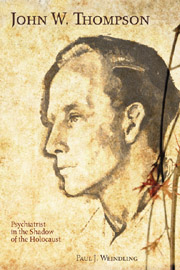Book contents
- Frontmatter
- Contents
- List of Illustrations
- Acknowledgments
- List of Abbreviations
- Part One Into the Dark
- 1 “Ecce Homo”
- 2 Mexican Childhood
- 3 Palo Alto Schooling, Stanford Student
- 4 Transatlantic Physiologist
- 5 Edinburgh Physician
- 6 Excitable Harvard
- 7 High Altitude and Rapid Descent
- 8 Auden, Anxiety, and the German Mind
- Part Two Redemption
- Part Three Aftermath
- Appendix John Thompson's Writings
- Notes
- Sources
- Index
2 - Mexican Childhood
from Part One - Into the Dark
Published online by Cambridge University Press: 12 September 2012
- Frontmatter
- Contents
- List of Illustrations
- Acknowledgments
- List of Abbreviations
- Part One Into the Dark
- 1 “Ecce Homo”
- 2 Mexican Childhood
- 3 Palo Alto Schooling, Stanford Student
- 4 Transatlantic Physiologist
- 5 Edinburgh Physician
- 6 Excitable Harvard
- 7 High Altitude and Rapid Descent
- 8 Auden, Anxiety, and the German Mind
- Part Two Redemption
- Part Three Aftermath
- Appendix John Thompson's Writings
- Notes
- Sources
- Index
Summary
“They That Walk in Darkness”
In 1935, Blackwood's [Edinburgh] Magazine published a story by Thompson about an unsettling medical expedition in Mexico. The story told a haunting tale about children growing up in the tropical Mexican province of Oaxaca: when they were young, they had full vision, but as they grew older, they progressively lost their sight. Acquiring knowledge meant a narrower perspective on life: children have vision, so the old depend on the young. Twenty years later, the author reflected on how children were the world's largest oppressed group, and yet they had innate wisdom. The child's vision was weighed against the blind accumulation of scientific discoveries.
We know little of Thompson's early childhood, his age of prescient vision. In his military service record, Thompson stated that his father was born in Oregon and was a “mathematical consultant.” His mother was Scottish. He stated that he was educated in Lausanne and Edinburgh before studying at Stanford, Oxford, and Edinburgh. As with the short story, his personal history meshes with the truth, but with elaborations.
His brother, Frank, was born when Thompson was seven, and his sister Margaret when Thompson was ten. Their memories of him date from when their elder brother was being schooled away from home, due to political upheavals in Mexico. Frank and Margaret recollect their parents' deep, serene love. The home for their six children was caring, ordered, and emotionally secure.
- Type
- Chapter
- Information
- John W. ThompsonPsychiatrist in the Shadow of the Holocaust, pp. 11 - 16Publisher: Boydell & BrewerPrint publication year: 2010



